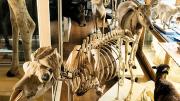The Great Mammal Hall, a two-story gallery 60 feet long by 40 wide, is the oldest and most dramatic in the Harvard Museum of Natural History (HMNH). The hall was emptied of its taxonomic treasures as part of a renovation commemorating the 150th anniversary of the founding of the Museum of Comparative Zoology: the animals were removed and repaired and the display cases restored to their nineteenth-century colors, replacing a palette dating to the 1960s. The gallery reopened October 16. Above, a gaur noses into the stream of escapees during the renovation.
Great Mammal Hall at Harvard Museum of Natural History reopens
Great Mammal Hall at Harvard Museum of Natural History reopens
The Great Mammal Hall in the Harvard Museum of Natural History is restored and reopened.

You might also like
Are “Little Red Dots” Keys to Understanding the Early Universe?
Harvard-Smithsonian astrophysicist Fabio Pacucci explains one of cosmology’s newest mysteries
Harvard Faculty of Arts and Sciences Appoints a New Finance Dean
Warren Petrofsky joins at a crucial moment when the FAS is dealing with a $350 million deficit.
Harvard Graduates Can Donate Directly to Their Houses on Housing Day
A new initiative encourages small-dollar donations for improving student life.
Most popular
Explore More From Current Issue

How Stories Help Us Cope with Climate Change
The growing genre of climate fiction offers a way to process reality—and our anxieties.







